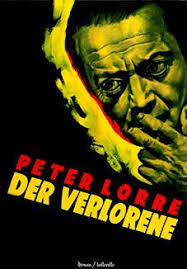
Dr. Karl Rothe (Peter Lorre) is a scientist for the Nazis during WWII. He is visited by Colonel Winkler (Helmuth Rudolph) who tells him that his fiancé Inge Hermann (Renate Mannhardt) sold his research secrets to the enemy. Winkler was notified by Rothe’s assistant Dr. Hosch (Karl John), who also happens to be Gestapo. Hosch found out because he was having an affair with Inge. Winkler tells Rothe that he needs to deal with the problem.
Rothe is living in a boarding house run by Inge’s mother Frau Hermann (Johanna Hofer). Frau Hermann needs to leave to stand in line to get potatoes. After she leaves Inge admits to Rothe about the secrets and the affair. Rothe strangles her. Hosch shows up and sees the situation. He calls Winkler. Winkler takes over from the police. The Nazis call it suicide and cover it up.
Rothe is sent back to work but something has happened to him mentally. He now has the urge to kill young women. When a new tenant, Ursula Weber (Eva Ingeborg Scholz) takes Inge’s room Rothe gets the impulse to kill her. He manages to stop himself and leaves the boarding house. At a bar he meets a prostitute (Gisela Trowe) that takes him home. At her door she looks at him and sees murder in his eyes. She screams for her neighbors. Rothe manages to once again stop himself.
On a train during an air raid he is alone with another young woman (Lotte Rausch). This time he doesn’t stop and murders her. Now guilt ridden about what he has become Rothe goes to find Hosch. Instead he stumbles onto a cabal. When Rothe tries to go home he finds the boarding house has been bombed. Everyone thinks he is dead. He changes his name and gets work at a refugee camp. Now here at the camp he ends up face to face with his nemesis Hosch.
“Der Verlorene” AKA “The Lost One” was released in 1951 in West Germany and 1984 in the U.S. It is Peter Lorre’s one and only directorial work. Done in the noir style it is a drama and reportedly based on a true story. Lorre wrote, directed and starred in the film.
In 1931 Peter Lorre did a movie by Fritz Lang called “M”. In it he portrays a serial child killer. Comparisons have been made between “M” and “Der Verlorene” and it’s understandable. Both deal with the pathology of the uncontrollable impulse to commit murder. Hans Beckert began killing at a young age and killed children. Rothe’s pathology didn’t occur until his was basically forced to kill Inge. It’s only then that his latent pathology emerges. Lorre’s portrayal of both Beckert and Rothe are chilling. Rothe’s victims especially are able to see in his eyes death.
The story of Rothe’s life is told in flashback when he is in the refugee camp. When Hosch finds himself in the same camp, and they are face to face, everything that happened to Rothe that brought him to this point comes back to him. Rothe is a victim himself of what the Nazis, and specifically Hosch turned him into. Lorre has a way of making Rothe appear sympathetic despite his horrific actions.
The film doesn’t start off a masterpiece. It’s slow as molasses at first and it can be quite confusing until the story puzzle is mostly put together but Lorre’s performance makes up for a lot of it. The movie didn’t do too well in Germany when it was released. By 1951 German’s were quite tired of WWII. Stories about how rotten Germany was during the war were not fun movies to see. It’s not until much later that the quality of the film began to be appreciated. Still “Der Verlorene” is a film that one must acquire a taste for. Not everyone will like it. Plus the only way to see it is with subtitles unless you understand German. I find it difficult to keep tract of the action if I have to read while I’m watching so quite often I have to watch a movie with subtitles at least twice to get it. In “Der Verlorene” some of the plot is suggested and geared toward German audiences so it’s really easy to miss important nuances and subtle implications. When you do understand it you realize that Lorre put a lot of himself into the film. Although there are black comedy elements scattered here and there the film is a serious drama about one man confronting his past and all its dark corners.

